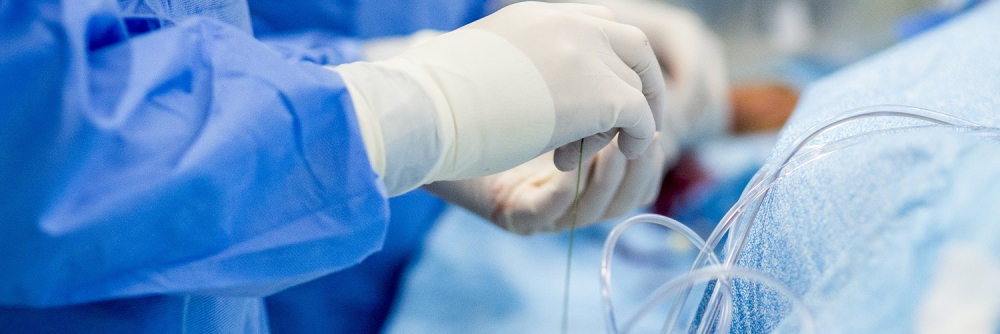Angiography
We offer a wide range of diagnostic and interventional (keyhole surgery) angiographic procedures.

Commonly asked questions about angiography
Angiography uses x-rays to take real time images, like a movie.
The doctor will place a small tube into a blood vessel and inject contrast through the tube, so the blood vessels can be seen clearly on the images.
Images of your blood vessels guide your doctor in diagnosing and treating a variety of illnesses.
You can find contact hours and phone numbers on our Radiology Department page.
At Alfred Health, we offer a wide range of diagnostic and interventional (keyhole surgery) angiographic procedures, including:
- Womens’ health
- Fibroid management
- Chronic pelvic pain management
- Mens’ health
- Sexual dysfunction
- Varicocele
- Cerebral (head)
- Diagnostic studies
- Aneurysm coiling
- Carotid artery stenting
- Vascular
- Peripheral vascular disease
- Diagnostic studies
- Angioplasty
- Stenting
- Dialysis access and maintenance
- Vascular malformation treatment
- Varicose veins management
- Vessel embolisation for tumors, trauma and haemorrhage management
- Long term vascular access insertion
- Inferior Vena Cava filter insertion and retrieval
- Deep vein thrombolysis
- Urogential
- Nephrostomy
- Ureteric stenting
- Renal artery angioplasty and stenting
- Renal tumour ablation and embolisation
- Hepatobilary and Gastrointestinal
- Percutaneous cholecystostomy
- Bilary stenting
- Liver tumour ablation and embolisation
- Feeding gastrostomy tube insertion
- Respiratory
- Lung tumour ablation
- Bronchial artery embolisation
- Pulmonary angiography
- Lymphangiography and embolisation
If you have been referred for an Inteventional Radiology procedure by your doctor and would like to make a booking, please contact Radiology Appointments on 03 9076 2963.
We ask that you bring all previous relevant medical imaging.
Please inform your doctor if you:
- have kidney problems
- have a heart condition
- have high blood pressure
- have diabetes
- take any regular medications
- take any blood thinning medications (such as warfarin, aspirin, plavix, or any other antiplatelet medications)**
- have ever had an allergy to contrast
- are pregnant
**Note: if you are taking any blood thinners, you may be required to stop these for a few days prior to the procedure
You will be asked to fast immediately before the procedure. However, please take your regular medication with a small mouthful of plain water, unless advised not to by your doctor.
You will be provided with a hospital gown when you check in for your procedure.
A radiologist, a radiographer and a radiology nurse will perform this procedure. The time it takes to perform the procedure will vary depending on the type of your procedure. Your radiologist will advise you on the day.
Most procedures only require a small injection of local anaesthetic at the insertion site to numb your skin.
In some cases stronger intravenous sedation or analgesia (pain killers) will need to be administered or a general anaesthetic may be required. The interventional radiologist will decide which is the most appropriate for you.
You will be observed by nursing staff for up to 4 hours. Some procedures required you to rest flat in bed during this time.
You can eat and drink normally after the examination, unless otherwise directed. You will be given an information sheet at discharge about your procedure.
The radiologist’s report and your images are automatically forwarded to your GP.